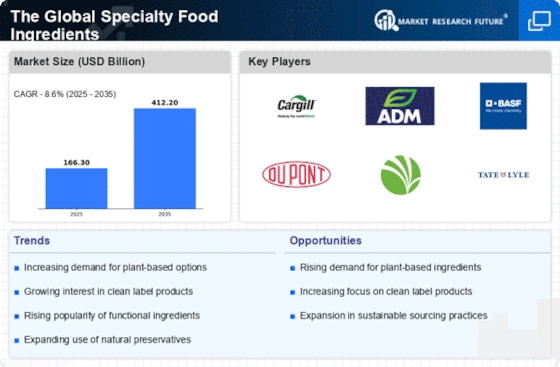Top Industry Leaders in the Specialty Food Ingredients Market
 The Specialty Food Ingredients market, a crucial segment within the global food and beverage industry, is characterized by a competitive landscape shaped by factors such as increasing consumer demand for unique and high-quality food products, advancements in food processing technologies, and the emphasis on natural and clean-label ingredients. As of 2023, key players strategically position themselves in this competitive environment, implementing various strategies to maintain or enhance their market share.
The Specialty Food Ingredients market, a crucial segment within the global food and beverage industry, is characterized by a competitive landscape shaped by factors such as increasing consumer demand for unique and high-quality food products, advancements in food processing technologies, and the emphasis on natural and clean-label ingredients. As of 2023, key players strategically position themselves in this competitive environment, implementing various strategies to maintain or enhance their market share.
Strategies Adopted:
Key players in the Specialty Food Ingredients market deploy a range of strategies to remain competitive. Continuous innovation in ingredient formulations and applications is a central strategy. Companies invest in research and development to create specialty ingredients that meet the evolving demands of consumers for healthier, more sustainable, and tastier food options. Strategic partnerships with food manufacturers, restaurants, and retailers contribute to expanding the market reach and product visibility of specialty food ingredients. Marketing efforts often focus on brand positioning, emphasizing the functionality, versatility, and clean-label nature of specialty ingredients.
Factors for Market Share Analysis:
Market share analysis in the Specialty Food Ingredients market is influenced by several factors, including brand recognition, product quality, pricing strategies, and distribution efficiency. Companies with strong brand equity and a reputation for producing high-quality specialty ingredients tend to secure a larger market share. Pricing strategies that balance affordability with perceived value play a crucial role, given the competition with other ingredient suppliers and the varying cost sensitivities of food manufacturers. Effective distribution networks, covering both traditional food processing channels and direct-to-consumer platforms, are vital for maintaining a competitive edge.
New and Emerging Companies:
While key players dominate the Specialty Food Ingredients market, new and emerging companies are entering the sector, often focusing on specific ingredient categories or introducing innovative and sustainable specialty ingredients. These entrants may emphasize organic and non-GMO formulations, unique flavor profiles, or cater to specific dietary and lifestyle preferences, contributing to the overall diversification and innovation in the Specialty Food Ingredients market. Although their market share may be relatively modest compared to industry leaders, these companies play a role in driving trends and meeting the evolving demands of health-conscious and adventurous consumers.
Industry News Trends:
The Specialty Food Ingredients market has witnessed noteworthy industry news and investment trends in 2023. Key players are investing in sustainability initiatives, responding to the growing consumer awareness of environmental impact. Collaborations with agricultural and farming organizations contribute to ensuring a consistent and responsibly sourced supply of raw materials for specialty ingredients. Additionally, investments in technology adoption, such as advanced extraction and processing methods, aim to enhance production efficiency and maintain the nutritional and sensory qualities of specialty food ingredients.
Competitive Scenario:
The overall competitive scenario in the Specialty Food Ingredients market is marked by intense rivalry among key players striving to capture a larger share of the growing market. The industry's competitiveness is evident in the emphasis on innovation, sustainability, and strategic collaborations to address evolving consumer preferences. The global reach of these companies enables them to adapt to regional tastes, capitalize on emerging markets, and navigate regulatory landscapes, contributing to the overall dynamism of the industry.
Key Players:
Archer Daniels Midland Company
Associated British Foods Plc
Cargill Incorporated
DuPont de Nemours Inc
Kerry Group plc
Recent Development in 2023:
Ingredion: To meet the increased demand for plant-based foods, the company introduced vegan baking mixes and plant-based egg substitutes.
Givaudan: In line with clean-label demands, the company introduced natural colourants and flavourings derived from fruits and vegetables.

- Beta
Beta feature










